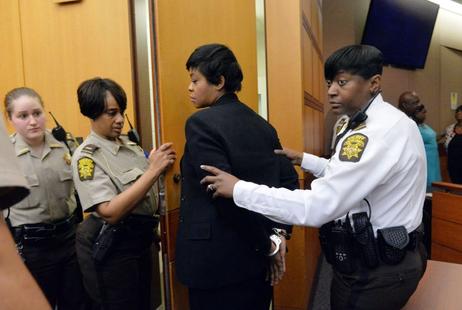The ongoing Atlanta Public Schools cheating scandal that has taken months to investigate is now in the punishment phase. Both teachers and administrators involved in the widespread cheating throughout the city are learning their fate, as the first batch of sanctions was handed out by the Georgia Professional Standards Commission. Those first sanctions may set the pace for how the state deals with similar cases of cheating and unprofessional conduct in the future.
Teachers Suspended, Licenses Revoked
According to a report at WTVM , the first batch of 11 educators implicated in the cheating scandal received their punishment from a vote by the Georgia Professional Standards Commission last week. The vote resulted in a two-year suspension of the teaching certificates of the eight teachers included in the group. The three administrators had their certificates revoked.
The punishments are considered rather stiff, particularly in light of the fact that this first batch of educators cooperated fully with investigators, which led to information that will move cases forward against additional individuals within the school system. Gerald Griggs, an attorney representing two of the teachers from Parks Middle School, said his clients were hoping for lesser penalties as a result of their cooperation.
“They felt pressure from the top,” Griggs explained to WTVM. “It was a culture that was going on. They were implicated in making erasures and changing test scores. My two clients that were implicated had admitted it and were being cooperative with authorities.”
When asked what he thought would be a more appropriate punishment for his clients, Griggs replied, “I think a suspension more in line of six months to a year would have been more in line with what happened to my clients.”
Educators to Receive Official Notification of their Fate
All 11 of those involved in this first set of penalties will receive formal letters from the commission, outlining the punishments and providing each individual with 30 days to respond, according to a report at USA Today. At this time, the names of these 11 educators will remain under wraps. However, once the punishment is accepted, the names of those involved will be revealed. If the educators choose to appeal the decisions, names will not be unveiled until the case is assigned to a judge by the Georgia Attorney General’s office.
These initial decisions will be the first of many to come out of the Atlanta Public School system. At this time, the Professional Standards Commission is looking at more than 200 cases in connection with the ongoing cheating scandal. One of those who is currently being investigated is Atlanta’s former superintendent, Beverly Hall. Hall has denied participating in the cheating and has publically apologized for not doing more to stop it while she was commissioner. The commission will be hearing additional cases from now until January at their monthly meetings.
Tough Punishments Set the Standard
The first punishments handed down in this scandal are tough by most standards. In other areas where cheating has been discovered, such as a recent problem in Connecticut, teachers were docked 20 days of pay and had to serve 25 hours of community service tutoring students. Typical punishment for such actions can range from a warning to revocation of teaching certification.
“I applaud Georgia for taking this issue seriously,” Walt Haney, a testing expert and professor of education at Boston College, told the Atlanta Journal-Constitution. “And I am thrilled the higher-ups who encouraged or condoned this behavior are getting a stiffer penalty than the ground troops. It’s so unusual.”
Some speculate that the harsher punishments in this scandal have to do with the unique features of the cheating problem in Atlanta. First, the cheating appears to have been widespread throughout the district, involving multiple schools and more than 200 teachers and administrators. Second, the discovery of the cheating was the result of an independent investigation launched by then-Governor Sonny Perdue, after a series of reports on irregular test gains by the Atlanta Journal-Constitution. Through this investigation, about 180 Atlanta Public School employees were implicated, and incidences of test tampering were discovered in no less than 44 area schools.
The executive secretary of the commission told the Atlanta Journal-Constitution that allegations of cheating will not be taken lightly in Atlanta. Kelly Hanson stated, “We’re going to protect the integrity of this profession, and we’re going to protect the students entrusted to educators.”
A History of Cheating
The test problems were first brought to the attention of the Atlanta Journal-Constitution, when the publication was notified that test scores throughout the district were statistically improbable. According to a report at the Washington Post, teachers either gave answers to students during the test-taking process, or changed answers after the fact, during the grading portion of the test.
Teachers that did not want to participate in the cheating, or threatened to report the actions to the proper authorities, were punished or retaliated against. This process created an element of fear among Atlanta educators, making it less likely anyone would come forward with allegations freely. That is why an independent investigation was required to bring the facts of the cheating scandal to light.
In addition to the individual punishments handed down to each of the educators implicated in the Atlanta cheating scandal, the school district faces the possibility of losing accreditation from the Southern Association of Colleges and School. The district was placed on probation by this national agency in January, and an accreditation ruling is expected in the next few weeks.











